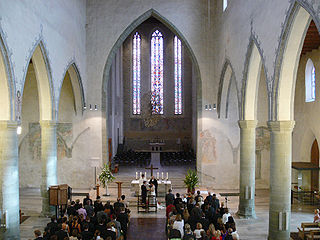
Christian terminology and theological views of marriage vary by time period, by country, and by the different Christian denominations.

Annulment is a legal procedure within secular and religious legal systems for declaring a marriage null and void. Unlike divorce, it is usually retroactive, meaning that an annulled marriage is considered to be invalid from the beginning almost as if it had never taken place. In legal terminology, an annulment makes a void marriage or a voidable marriage null.

Marriage in the Catholic Church, also known as holy matrimony, is the "covenant by which a man and woman establish between themselves a partnership of the whole of life and which is ordered by its nature to the good of the spouses and the procreation and education of offspring", and which "has been raised by Christ the Lord to the dignity of a sacrament between the baptized". Catholic matrimonial law, based on Roman law regarding its focus on marriage as a free mutual agreement or contract, became the basis for the marriage law of all European countries, at least up to the Reformation.
In the canon law of the Catholic Church, a distinction is made between the internal forum, where an act of governance is made without publicity, and the external forum, where the act is public and verifiable. In canon law, internal forum, the realm of conscience, is contrasted with the external or outward forum; thus, a marriage might be null and void in the internal forum, but binding outwardly, i.e., in the external forum, for want of judicial proof to the contrary.
A lapsed Catholic is a Catholic who is non-practicing. Such a person may still identify as a Catholic, and remains one according to Catholic canon law.
Validity and liceity are concepts in the Catholic Church. Validity designates an action which produces the effects intended; an action which does not produce the effects intended is considered "invalid". Liceity designates an action which has been performed legitimately; an action which has not been performed legitimately is considered "illicit". Some actions can be illicit, but still be valid.

The Pauline privilege is the allowance by the Roman Catholic Church of the dissolution of marriage of two persons not baptized at the time the marriage occurred. The Pauline privilege is drawn from the apostle Paul's instructions in the First Epistle to the Corinthians.
Ligamen or vinculum is, in Roman Catholic canon law, an existing marriage tie, which constitutes an impediment to the contracting of a second marriage.
In the canon law of the Catholic Church, an impediment is a legal obstacle that prevents a sacrament from being performed either validly or licitly or both. The term is used most frequently in relationship to the sacraments of Marriage and Holy Orders. Some canonical impediments can be dispensed by the competent authority as defined in Catholic canon law.
In the Catholic Church, a declaration of nullity, commonly called an annulment and less commonly a decree of nullity, and in some cases, a Catholic divorce, is an ecclesiastical tribunal determination and judgment that a marriage was invalidly contracted or, less frequently, a judgment that ordination was invalidly conferred.
Tametsi is the legislation of the Catholic Church which was in force from 1563 until Easter 1908 concerning clandestine marriage. It was named, as is customary in Latin Rite ecclesiastical documents, for the first word of the document that contained it, Chapter 1, Session 24 of the Council of Trent. It added the impediment of clandestinity and established the canonical form of marriage for validity in the regions in which it was promulgated.
Petrine privilege, also known as the privilege of the faith or favor of the faith, is a ground recognized in Catholic canon law allowing for dissolution by the Pope of a valid natural marriage between a baptized and a non-baptized person for the sake of the salvation of the soul of someone who is thus enabled to marry in the Church.

An interfaith marriage, also known as an interreligious marriage, is defined by Christian denominations as a marriage between a Christian and a non-Christian, whereas an interdenominational marriage is between members of two different Christian denominations, such as a Lutheran Christian wedding a Catholic Christian, for example.
Christian views on divorce find their basis both in biblical sources and in texts authored by the Church Fathers of the early Christian Church, who were unanimous in the teaching regarding the issue.
In the canon law of the Catholic Church, excommunication is a form of censure. In the formal sense of the term, excommunication includes being barred not only from the sacraments but also from the fellowship of Christian baptism. The principal and severest censure, excommunication presupposes guilt; and being the most serious penalty that the Catholic Church can inflict, it supposes a grave offense. The excommunicated person is considered by Catholic ecclesiastical authority as an exile from the Church, for a time at least.

There are seven sacraments of the Catholic Church, which according to Catholic theology were instituted by Jesus Christ and entrusted to the Church. Sacraments are visible rites seen as signs and efficacious channels of the grace of God to all those who receive them with the proper disposition.
In the canon law of the Catholic Church, a person is a subject of certain legal rights and obligations. Persons may be distinguished between physical and juridic persons. Juridic persons may be distinguished as collegial or non-collegial, and public or private juridical persons. The Holy See and the Catholic Church as such are not juridic persons since juridic persons are created by ecclesiastical law. Rather, they are moral persons by divine law.
In the Catholic Church, communicatio in sacris, also called communicatio in divinis or communicatio in ritibus, designates the regulations for the partaking of a Catholic person to a non-Catholic sacrament or liturgical celebration, or for the partaking of a non-Catholic person to a Catholic sacrament or liturgical celebration. The expression is also used to refer to said acts of partaking themselves.
The term ratum sed non consummatum or ratum et non consummatum refers to a juridical-sacramental category of marriage in Catholic matrimonial canon law. If a matrimonial celebration takes place (ratification) but the spouses have not yet engaged in intercourse (consummation), then the marriage is said to be a marriage ratum sed non consummatum. The Tribunal of the Roman Rota has exclusive competence to dispense from marriages ratum sed non consummatum, which can only be granted for a "just reason". This process should not be confused with the process for declaring the nullity of marriage, which is treated of in a separate title of the 1983 Code of Canon Law.
A conditional sacrament or sacramentsub conditione is in some Christian denominations a sacrament administered "on the condition that the faithful [receiving it is] able and legitimately entitled to receive the sacrament". An example of conditional sacrament is conditional baptism.






